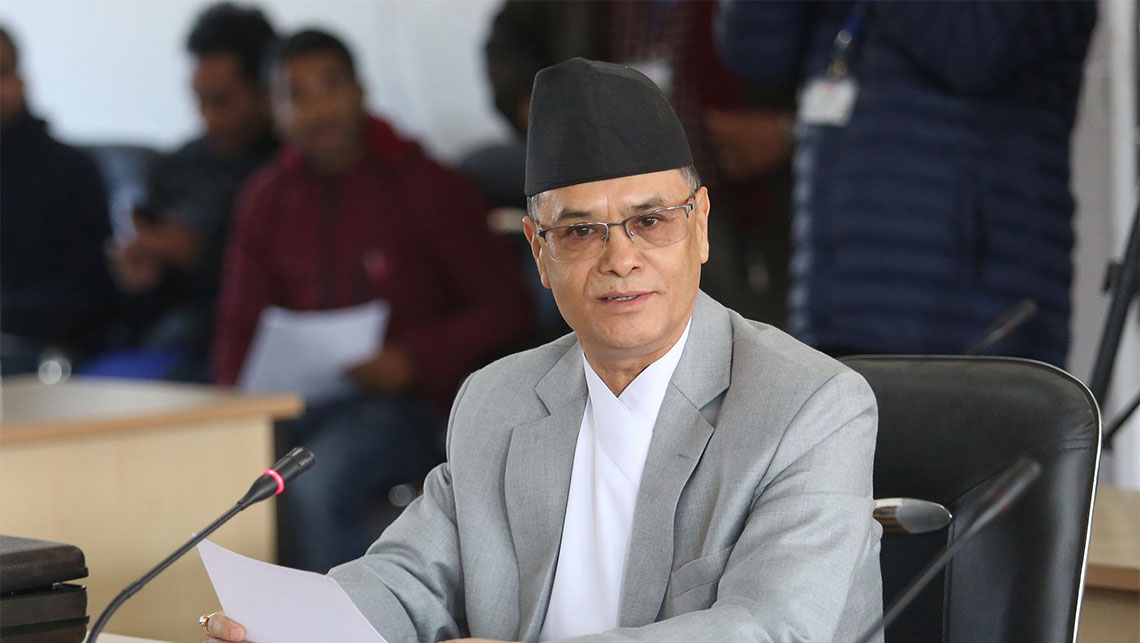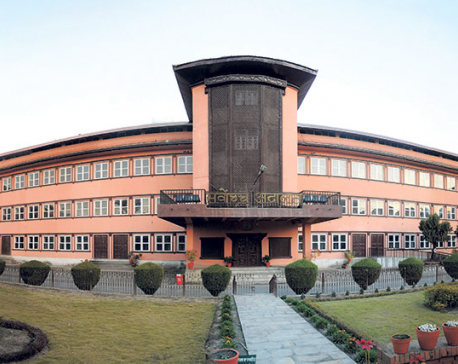
OR
Chief Justice retires without getting justice
Published On: December 14, 2022 05:30 PM NPT By: Bhasa Sharma

KATHMANDU, Jan 14: Chief Justice Cholendra SJB Rana retired on Tuesday due to the age limit of 65 years, nine months after he was suspended from the post. The impeachment motion against him could neither be endorsed by parliament nor could he get a clean chit.
He assumed office on 2 January, 2019 after taking the oath of office and secrecy. On 13 February, 2022, an impeachment motion was registered against Rana, accusing him of failure to discharge his official responsibilities properly.
Rana courted controversy after he allegedly “sought his share in the executive”and was isolated by his colleagues. Rana is the first Chief Justice of the Supreme Court to be asked to resign by his fellow justices. When Rana got into controversy, the justices who shared the bench with him, didn’t want to be with him.
Nepal’s 29th Chief Justice Rana had assumed office with a promise to end corruption, middlemen culture and delay in the courts. However, he was unable to do so and courted controversy instead.
Nepal Bar Association (NBA), the umbrella organization of lawyers, also protested for almost a year demanding Rana's resignation. Under the pressure of the lawyers' movement, MPs from the ruling Nepali Congress (NC), CPN (Maoist Center), CPN (United Socialist) and other parties registered the impeachment motion against Rana at the Parliament Secretariat.
Even after the impeachment motion was registered, the ruling parties deliberately delayed the process in parliament. Rana was summoned by the Impeachment Recommendation Committee for recording his statement only when the term of parliament was about to end. However, before parliament could take any further action, its term came to an end.
Similarly, there was a dispute in the court in October 2021 due to Rana. Hearing on the cases at the Supreme Court was also stalled as Rana and other justices maintained their own stands over the dispute. The controversy escalated when the justices asked Chief Justice Rana to resign from the post.
Cause of dispute
On October 8, 2021, Prime Minister Sher Bahadur Deuba appointed Chief Justice Rana's relative Gajendra Hamal as the Minister for Industry, Commerce and Supplies. The matter of Hamal being made a minister from Rana's side was leaked. The other justices of the Supreme Court started a protest against Rana saying that it was wrong for the judiciary to seek a share in the executive. Hamal resigned on October 10 within two days of being appointed a minister.
Then on October 24, Rana’s colleagues decided not to cooperate with him. At the full meeting of the SC called by the Chief Justice Rana, 14 of the judges present said that they would not cooperate with him. Then 19 judges of the SC stood against Rana.
Rana’s journey as Chief Justice
On December 13, 2018, the meeting of the Constitutional Council unanimously recommended the name of Cholendra SJB Rana as the Chief Justice. The meeting of the Constitutional Council chaired by the then Prime Minister KP Sharma Oli recommended Rana for appointment as the Chief Justice based on seniority as per the constitution.
A complaint was filed in the parliamentary committee that "Rana had committed irregularities in deciding the case as a justice". Complaints alleging that his performance was wrong were submitted to the committee.
With 18 days left for Chief Justice Om Prakash Mishra to retire due to age limit, the Council recommended Rana's name.
On November 25, 2018, the Judicial Council Secretariat sent the records of two senior justices Rana and Deepak Raj Joshi of the SC to the Constitutional Council. Rana's name was directly recommended as the Parliamentary Hearing Committee had already rejected the name of Joshi. The Constitutional Council meeting held on June 12, 2018 recommended the name of Deepak Raj Joshi as the Chief Justice. Joshi's name was rejected by the parliamentary committee.
Rana, who became the 29th Chief Justice on January 2, 2019, had vowed to end corruption, middlemen culture, and delays in the courts. Right after assuming office, Rana said that he would create a mechanism to reform the court. He also said that any political pressure on the judiciary was not acceptable.
Within 15 days of assuming the leadership of the judiciary, Rana deputed five judges of the high courts at the Judicial Council. It was considered the beginning of what appeared to be the first reforms in the judiciary. Rana also formed a study committee headed by Justice Hari Krishna Karki to reform the court. However, he became criticized after delaying the implementation of the report given by the committee.
Earlier, Rana had heard the writ petition filed against the impeachment of Chief Justice Sushila Karki and helped her to get back to the court.
You May Like This
_20211114122844.jpg)
Constitutional bench formed to hear writ petition against lifting of suspension of CJ Rana
KATHMANDU, Dec 9: The Supreme Court has constituted a constitutional bench to hear the writ petition against the lifting of... Read More...

CJ Rana assigns benches for all types of cases
KATHMANDU, Nov 15: Chief Justice Cholendra SJB Rana has assigned benches to hear all kinds of cases including habeas corpus. Read More...




Just In
- Nepal faces Hong Kong today for ACC Emerging Teams Asia Cup
- 286 new industries registered in Nepal in first nine months of current FY, attracting Rs 165 billion investment
- UML's National Convention Representatives Council meeting today
- Gandaki Province CM assigns ministerial portfolios to Hari Bahadur Chuman and Deepak Manange
- 352 climbers obtain permits to ascend Mount Everest this season
- 16 candidates shortlisted for CEO position at Nepal Tourism Board
- WB to take financial management lead for proposed Upper Arun Project
- Power supply to be affected in parts of Kathmandu Valley today as NEA expedites repair works






_20220508065243.jpg)








Leave A Comment